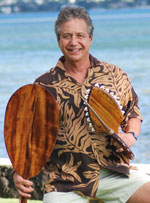Trader admits smuggling ivory to PH for resale in Hawaii
HONOLULU— The owner of a Hawaii jewelry and gift retail business pleaded guilty Thursday, March 9, to a federal conspiracy charge, admitting he smuggled Alaska ivory to the Philippines, where they were carved into fish hooks then shipped back and passed off as made in Hawaii by local artisan
Authorities say Curtis Wilmington purchased raw walrus tusks and whale teeth from an undercover agent from Alaska and smuggled black coral from Mexico to Hawaii. The items have federal protections that require declaration, permitting and licensing for exporting or importing.
Wilmington said he was “cutting corners” and knew it was illegal when he didn’t properly declare the shipments.
He described hiding the ivory among koa wood he sent to the Philippines to be carved.
According to court documents, Wilmington and others in his company, Hawaiian Accessories, Inc., removed the “made in the Philippines” labels once the ivory returned to Hawaii as fish hooks.
Undercover agents purchased the fish hook pendants at a Waikiki hotel boutique and at the Merrie Monarch hula festival in Hilo, Hawaii. Agents said they had previously tagged the items when they intercepted smuggled shipments and then delivered them to the company.
Wilmington’s company passed the items off as being made with fossilized material in Hawaii, authorities said.
The fish hooks sold for about $250 each, authorities said. Federal prosecutors and Wilmington disagree about the value of the smuggled items. Assistant U.S. Attorney Ronald Johnson said it was about $105,000, but Wilmington says the amount is less.
Misrepresenting where cultural crafts are made has recently been an issue in Alaska, where four shops catering to cruise ship visitors sold whale and walrus bone carvings for $1,000 or more a piece. Shop owners falsely claimed they were made by Alaska Native artists, according to federal prosecutors.
Wilmington and his wife are Native Hawaiians who “started out in 1986 showcasing their unique koa jewelry at cultural events,” according to Hawaiian Accessories’ website. “Having backgrounds in the travel industry, Leslie and Curtis realized the need for authentic Hawaiian gifts and created a high quality line of products that perfectly suited the visitor market,” the site says.
Curtis Wilmington faces up to five years in prison when he’s sentenced in June. Other company officials, including his daughter, are scheduled to plead guilty next week.
Animal rights organizations say Hawaii could become the largest ivory market in the U.S. if the market is left unregulated. A bill that passed the House would ban the sale of elephant ivory, as well as certain animal parts like tiger pelts and rhinoceros horn.
Like us on Facebook















